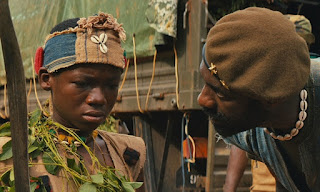 |
| Abraham Attah and Idris Elba |
Netflix parked its tanks on the lawns of the TV
networks with its mini-series House of
Cards; with Beasts of No Nation
they are now parking their metaphorical tanks in the foyers of multiplexes all
over the world.
Netflix makes its first foray into original movies
with this occasionally harrowing but also at times plodding story of boy
soldiers. It follows a fairly well-trodden path in the wake of Hotel Rwanda, Shooting Dogs, and City of Men as our young hero Agu deals
with a childhood torn away by civil war.
Agu and his family live in an unnamed African state
which is at the heart of a revolutionary struggle. When his mother is sent to
safety Agu is left behind but with his father and brother they join the other
men in defending their homes. The fight does not last long; his father and
brother are quickly killed and Agu flees into the jungle.
Coming across a ragtag band of child rebels led by Commander
(Idris Elba), a warlord with Messianic pretentions, Agu becomes one of
Commander’s favourites. After a brutal initiation ceremony he is accepted as a
fully-fledged soldier and promoted to Commander’s team.
This is a Lord
of the Flies story about a loss of innocence and the battle for the soul of
a young boy. It has a number of powerful moments but at 2 hours and 20 minutes
it could easily lose half an hour with no loss of impact.
Directed, written and shot by True Detective’s Cary Fukunaga the film is firmly in the naturalist
tradition with lots of long takes and not much happening. The real wonder is in
the visuals. Fukunaga was also responsible for processing and he was inspired
by the look of late 20th century combat photo-journalism. The care
and attention he has lavished here means that in places the film has the
organic richness of the pictures of Don McCullin.
Fukunaga cast real-life Liberian rebels in the
Commander’s band for authenticity but the most honest and authentic performance
in the film comes from Abraham Attah as Agu. He is completely compelling in
contrast to Elba who gives his usual one-note performance but with a slightly
different accent.
After some success in the festival circuit Beasts of No Nation is attracting early
Oscar buzz. Not wishing to be harsh, if this is an Oscar contender then we have
a fairly barren three months ahead of us. Netflix don’t care really; what they
want is the perception of quality around this film.
They spent $12 million to acquire the distribution
rights secure in the knowledge of what would happen next. The plan was to
release the film theatrically exclusively for a week in a couple of cinemas –
thus ensuring Oscar eligibility – and then release it day and date in other
cinemas and on Netflix.
As they must have known would happen cinema chains
boycotted the film, it played on barely 30 screens in the United States and was
a resounding box office flop. None of that matters because the film is being
talked about and so is Netflix and when you consider they spent $100 million on
House of Cards, a $12 million investment here makes good sense.
Looking to the future what Netflix have done is
significant, especially in the week when the release of the new Star Wars trailer almost breaks the internet.
The company doesn’t release audience figures but it’s a safe bet that more
people will stream this film than would ever go and see it in a cinema. Perhaps
I’m wrong but it doesn’t strike me that there is a vast unsatisfied army of
Idris Elba fans out there.
But a marker has been put down which must surely
end up in a two-tier distribution system. The Star Wars and summer
blockbusters of this world will have the cinemas to themselves, but niche films
like Beasts of No Nation now surely
have a new route to market and that must be a good thing for innovation,
diversity, and imagination.
The theatre owners may appear to have won the
battle this time but Netflix have deep pockets and my feeling is that they will
win the war.



No comments:
Post a Comment